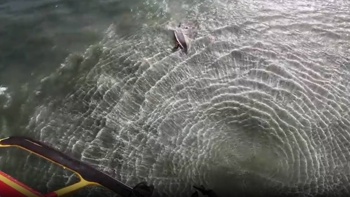
The Supreme Court has quashed the convictions of Peter Ellis saying there was a "substantial miscarriage of justice" in the case of the former creche worker who was jailed for child sexual abuse in 1993.
The unprecedented and complex legal case made history today and may create a seismic shift in the future of New Zealand law after Ellis became the first person to have his convictions quashed posthumously.
Ellis died of bladder cancer in 2019, just months after the Supreme Court granted leave to hear a last-ditch appeal to clear his name.
The then 61-year-old had steadfastly maintained his innocence of the 13 convictions for almost three decades in a case that polarised the country.
His lawyer continued to argue the appeal using tikanga Māori custom, where a person's mana is as important in death as in life, following a suggestion by the Supreme Court justices.
Today the five judges led by Chief Justice Helen Winkelmann "unanimously" quashed Ellis' convictions and said a "substantial miscarriage of justice" had occurred in his case.
It comes as a shock to the complainants who said in a statement they were saddened by the Court's decision.
"The trauma of not being believed over the years takes its toll. The court of public opinion is often ill-informed and the facts are lost," they said.
"Our children deserved to be safe in the care of adults. They were not."
- Supreme Court bid to clear Peter Ellis expected to go ahead
- Peter Ellis' appeal to be heard from beyond the grave in landmark case
In the justices' decision, read out via livestream from the Court in Wellington at 2pm, they found that some evidence at Ellis' trial was unfair and should not have been admitted.
This included the evidence of the Crown's expert witness, psychiatrist Dr Karen Zelas, under section 23G of the Evidence Act 1908.
Zelas gave evidence that the parents who accused Ellis of abusing seven children reported behaviour that Zelas said was consistent with sexually abused children.
They included common childhood behaviours such as problems with sleeping and bedwetting but also "sexualised behaviour".
The Supreme Court found Zelas' evidence lacked balance, did not inform the jury of other possible causes of the behaviours, or where she did so she discounted or minimised the other causes.
/cloudfront-ap-southeast-2.images.arcpublishing.com/nzme/3ZDFVMQBJTSUYO5275W32GEGF4.jpg)
Peter Ellis with then lawyer Judith Ablett-Kerr, KC, in 2001. Photo / NZME
It said in several respects Zelas went outside the scope of evidence permitted, in particular endorsing the credibility of a complainant's evidence or suggesting one or more behaviours were diagnostic of sexual abuse, and that the jury may have understood Zelas' evidence as doing both.
The Court said the overall effect of Zelas' evidence was to incorrectly suggest to the jury that the presence of clusters of behaviours could support a conclusion that sexual abuse had taken place.
It concluded that, given the extent of the inadmissible material and its impact on the trial "it may well have affected the verdicts and thereby caused a miscarriage of justice".
The justices also found issues with Zelas' evidence on contamination of the children's memory.
At trial Ellis' defence used the argument that the complainants' evidence was contaminated by a number of influences, the most significant being direct questioning by parents.
In the appeal to the Supreme Court Ellis' lawyer Rob Harrison relied on new testimony from Professor Harlene Hayne who identified potential sources of contamination including meetings involving parents of complainants during the investigatory stage, discussions about the allegations between parents and complainants, parent-to-parent discussions and complainant-to-complainant discussions.
An expert witness for the Crown, Professor Gail Goodman, agreed with Professor Hayne and believed there was a high risk of contamination of the evidence of four of the complainants.
The Court considered it significant that Zelas expressed concern about possible contamination of the accounts by two of the children before the trial, but expressed no concern at the trial.
While she accepted children can be suggestible, she did not detect any adult input in the complainants' evidence.
The Court concluded that while the risk of contamination was canvassed at the trial, the jury was not fairly informed of the level of the risk.
It said the expert evidence had given the jury a false sense of reassurance that contamination risk was low, and that if evidence was contaminated the jury would be able to detect it.
The Court said new evidence from studies done since the trial showed the risk of contamination was higher than the jury was led to believe and that contamination of a child's memory would not have been readily detectable.
Ellis was first accused of abusing a child while working at the Christchurch Civic Creche in 1991 when a 4-year-old said he didn't like "Peter's black penis".
/cloudfront-ap-southeast-2.images.arcpublishing.com/nzme/7L7Q52IWR6OHXJW7VIUH4FXQLY.jpg)
Peter Ellis died of bladder cancer in 2019, before the Supreme Court could hear his appeal. Photo / NZME
Following this, further allegations were made and Ellis was taken into custody on his 34th birthday in 1992.
At the time the country was caught in the grip of anxiety over increased child sexual abuse internationally and rumours were rife about supposed satanic ritual abuse of children.
Ellis was initially found guilty of 16 counts of sexual offending and sentenced to 10 years behind bars.
In 1994 one victim recanted her story before the Court of Appeal and said she had lied to please her mother. Three charges were withdrawn, leaving 13 convictions.
Ellis continued to fight to clear his name in the courts, through the media, and with the help of his legal team after his release from jail in 2000.
Ellis appealed twice before today's success and a ministerial inquiry in 2000 by retired former Chief Justice Sir Thomas Eichelbaum found interviewing of the children was appropriate and had not been undermined or contaminated.
"The release of this judgment marks the end of a long and painful journey through the courts for the many people involved in this case," the Supreme Court said.
Two hearings had determined if Ellis' appeal would be considered with the second concerning the relevance of Tikanga Māori. The two-week appeal went ahead last year.
The Supreme Court justices said the grounds for an appeal were strong and raised systemic issues.
The complainants react to the decision
The complainants' full statement with reaction to the decision:
"Today we would like first and foremost to acknowledge and thank all of the children who, nearly three decades ago suffered terrible abuse and who live with the effects of that abuse today.
"Asking children at the age of five or six to give evidence in a court of law, after having had interviews with people they had never met, and had no reason to trust was always going to be a huge ask of both the children and their families.
"The fact that some managed to do this was the exception rather than the rule.
"The children who did go to court have carried a huge burden all these years, but they know that what the told the court was backed up by the other abused children who for a variety of reasons were unable to testify.
"We would also like to thank the police for all their work over the years and acknowledge and thank all the people who gave evidence in support of the children.
"It's important at this time to remember that the evidence against Peter Ellis has received an unprecedented level of legal scrutiny over the years.
"The judge and jury in the original trial believed the children, two appeals to overturn those convictions were lost and and a Commission of Inquiry upheld the verdicts.
"We as parents would like to acknowledge the Supreme Court's recognition in this latest decision, that the judgement was in no way a criticism of the parents, the complainants or those involved in the investigation or trial.
/cloudfront-ap-southeast-2.images.arcpublishing.com/nzme/VSE3ARFMZ7P46DG6CMZZYEZ374.png)
The Supreme Court decision quashing Ellis' convictions was handed down by Chief Justice Helen Winklemann today. Photo / Mark Mitchell
"We also want to acknowledge the court's recognition of the high levels of additional stress that has been occasioned by the hearing of this appeal.
"Having said that, in quashing the convictions, we believe the Court has favoured a convicted criminal, and ignored the victims.
"They have not been allowed a voice in this process. Some are too afraid and traumatised still, but we as parents want to speak out and say loud and clear once again.
"We hear you and we believe you.
"The trauma of not being believed over the years take its' toll. The court of public opinion is often ill-informed and the facts are lost.
"Our children deserved to be safe in the care of adults. They were not.
"The legacy of this case ensured that childcare centres around New Zealand became safer places for all children and staff.
"The Civic Creche children, now adults, know what happened to them.
"Today we want to thank them all again for their bravery and courage."
An interview with Peter Ellis shortly before his death
NewsTalk ZB's Mike Hosking spoke with Ellis weeks before his death in 2019, when he prophesized the continuation of his appeal beyond his own life.
Ellis hoped that if he died before the appeal those impacted would find closure.
"I am hoping that the select committee might look at putting in something that would safeguard someone's right to still clear their name even when they have passed away," he said.
"There should be a mechanism if someone has shown intent to push on with their case, worked hard on the case, was shown intent to go for compensation - that his family have the right to have his name cleared, as do I."
When Ellis spoke with Hosking he was "feeling quite excited" about his appeal hearing later in the year.
His spirits were high despite his recent cancer diagnosis but tears were shed when he spoke of the toll the convictions had on him.
He was optimistic and grateful to the team of experts who had worked on his appeal case and to all the people who had worked with him and supported him over the 27-year battle.
He told Hosking that clearing his name was not only important to him, but to all of his supporters over the years.
"It becomes important when the number of people who have supported me and helped me over the years have passed away; the stories that haven't been told of parents that chose sides and their marriages broke up; the crèche children that didn't believe it happened – so there is that particular aspect of it.
"There is also my mother who put her time into this - those people who have slipped away and have deserved an answer," he said.
- Hazel Osborne, Open Justice
Take your Radio, Podcasts and Music with you









